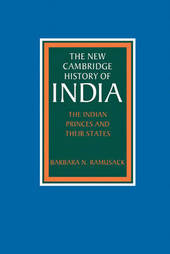
|
The Indian Princes and their States
Hardback
Main Details
Description
Although the princes of India have been caricatured as oriental despots and British stooges, Barbara Ramusack's study argues that the British did not create the princes. On the contrary, many were consummate politicians who exercised considerable degrees of autonomy until the disintegration of the princely states after independence. Ramusack's synthesis has a broad temporal span, tracing the evolution of the Indian kings from their pre-colonial origins to their roles as clients in the British colonial system. The book breaks new ground in its integration of political and economic developments in the major princely states with the shifting relationships between the princes and the British. It represents a major contribution, both to British imperial history in its analysis of the theory and practice of indirect rule, and to modern South Asian history, as a portrait of the princes as politicians and patrons of the arts.
Author Biography
Barbara Ramusack is Charles Phelps Taft Professor of History at the University of Cincinnati. Her publications include Women in Asia: Restoring Women to History (1999), and The Princes of India in the Twilight of Empire: The Dissolution of a Patron-Client System, 1914-1939 (1978).
Reviews'Barbara Ramusack's The Indian Princes and their States is a significant contribution to the history of princely India and the nature of indirect rule under British paramountcy ... The Indian Princes and their States is a long overdue treatment of princely India during the colonial period ... Her research is rich, interweaving primary literary and oral sources, colonial and postcolonial histories, archival photographs, paintings, maps, and references to literature, film and music. Her prose is readable; her language concise and clear. Furthermore, there is a sense of this scholar's deep interest in her topic ... It is a vital resource on an area of Indian history that has often been neglected.' Journal of the Oxford University History Society '... this is [a] good book and deserves a wide readership.' The Muslim World Book Review 'Ramusack is to be commended ...' Review in History 'There are few scholars with greater qualifications to undertake this survey study of the states than Barbara Ramusack. One of the first and one of the most significant scholars to examine the states seriously, she brings to this project a long familiarity with both the scholarship and the research challenges. ... Ramusack's rich personal research achievement enriches and adds credibility to the usual survey treatment of the other volumes in this series. Clearly, here is one of the best in the New Cambridge History of India set. ... richly textured ... a complex and important book, simultaneously a grand introductory volume to the Indian princes accessible to the neophyte (the focus of the Cambridge series) and a cautionary and inspirational test for those engaged in research on the states ... masterful ...' The Journal of Asian Studies '... a considerable scholarly achievement ... Broad-ranging in its coverage, both geographically and thematically, it will be an important reference work for all those interested in modern South Asian history.' Contemporary South Asia 'This outstanding book fills a glaring gap in India historiography; it is the result of thorough research in archives and the literature and is very likely to achieve the status of a classic contribution ... a well documented history of colonialism in India from a new perspective. They include important surveys of research done or still missing, of discrepancies in British administration and diversity of the Indian States. The author's rigorous sense of nuances helps her to draw an authoritative picture of many aspects of the often over-simplified princely positions ... this major work was indeed written in the spirit of the Rudolphs' 'modernity of tradition' and Benedict Anderson's approach to history. It is a 'must'.' Journal of Colonialism and Colonial History '... not only an important contribution to South Asia's modern history, but a fine synthesis of academic research done in the past decades. Ramusack's book will encourage historians of South Asia to take a different view of the princely states. Her well written opus thus serves as a point of departure for an, ultimately, new writing of South Asia's history.' Internationales Asienfoum
|